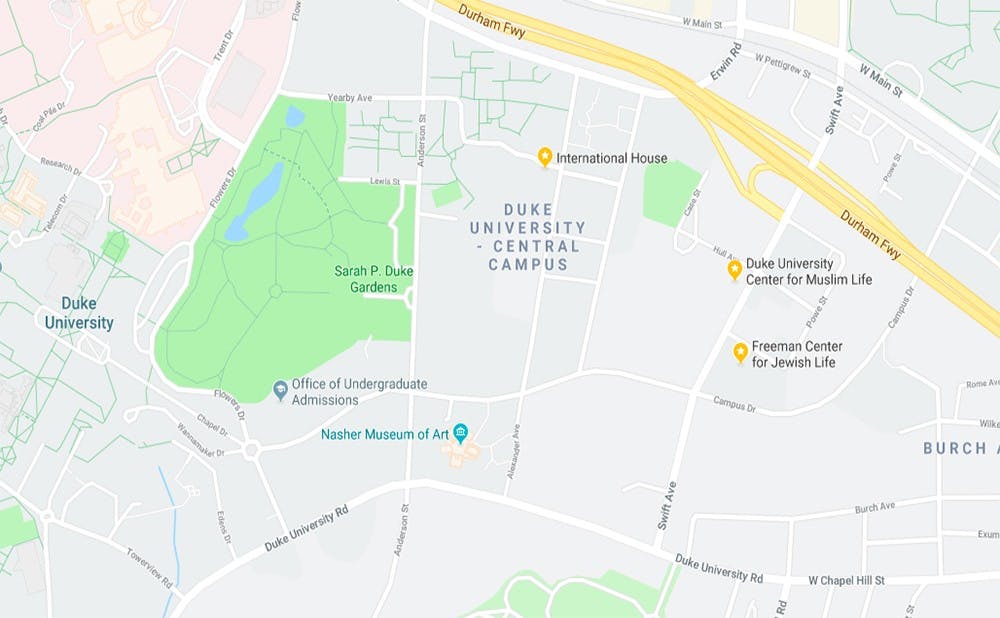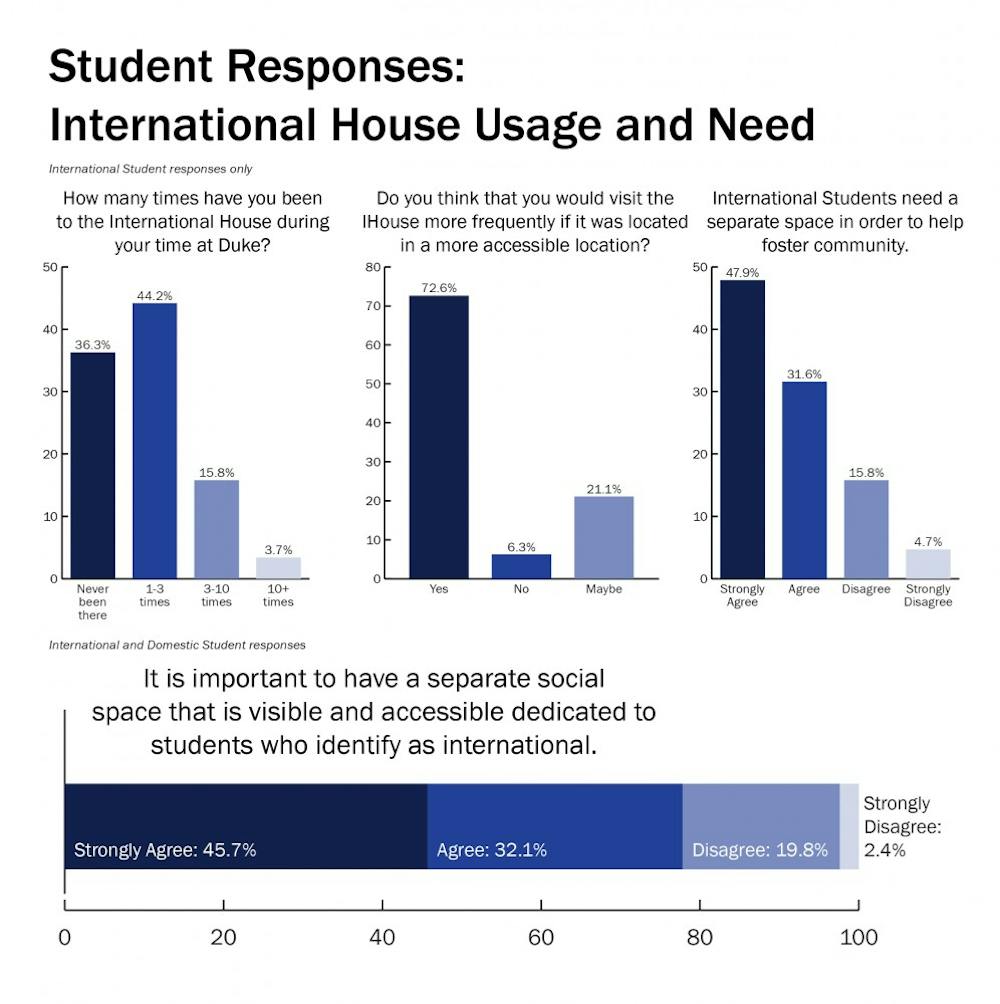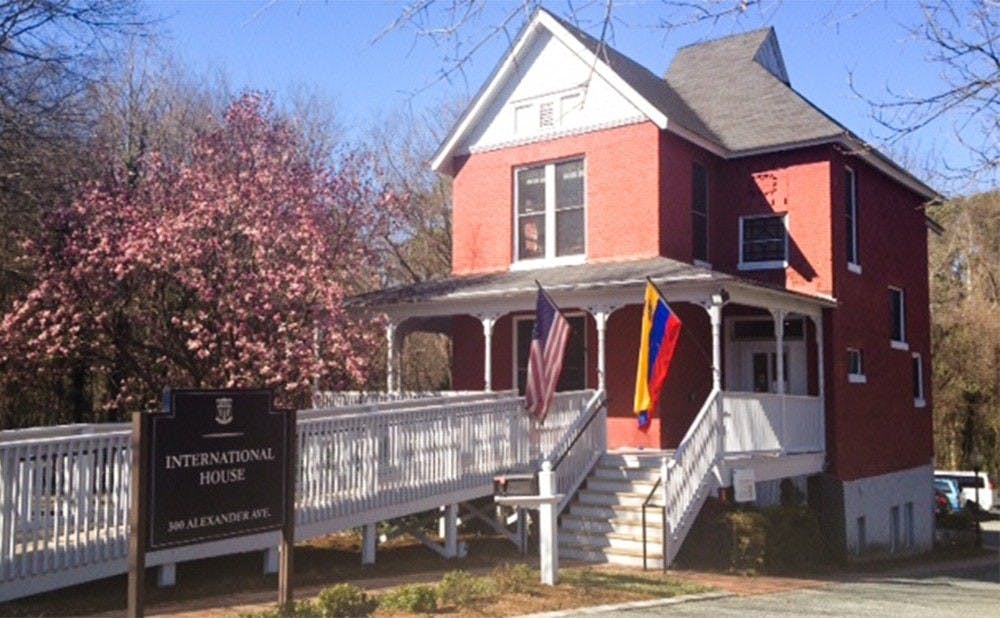While Central Campus undergoes demolition, International House will stay there for at least another year—and the president of International Association said he didn’t know about it until Spring 2019.
International House, known as I-House, will remain open and operate at regular hours at 300 Alexander Avenue, wrote Lisa Giragosian, director of the International House, in an email. The current location is in the middle of Central Campus, across from the former Pi Kappa Phi section and near the Duke Graduate and Professional Student Council offices.
Senior Shyam Pradheep, president of the International Association, said that there are “no concrete plans” as of now because the administration has not yet decided on an alternative location for I-House.
“For right now, [I-House is] just stuck on Central because there’s no other space to move them to, and there’s no other place for an institution as large as the I-House,” Pradheep said.
From what Pradheep has heard from I-House staff, he explained that when the staff first found out that Central Campus was going to be demolished, they did not know I-House would stay in the current building. International students visit I-House for a variety of reasons, from filling out paperwork to building awareness of the international community among students.
Larry Moneta, vice president for student affairs, wrote in an email that he has been working on the issue for nearly two years because “a suitable alternative” has not yet been decided.
“Consideration of alternatives will proceed into the coming year and I’m confident that good options will be identified by my successor working with many others at Duke,” wrote Moneta, who is stepping down from his role June 30. “In the meantime, conditions will be fine for I-House staff to maintain their excellent work.”
When the International Association started discussing the future of I-House, students began to draft a proposal with I-House staff to submit to Duke administrators.
“The whole idea of keeping International House on Central was something decided last year, and all of last year was essentially transitionary for Larry Moneta,” Pradheep said.
He clarified in an email that he was notified of the decision last semester and was certain students were not involved until Spring 2019.
Pradheep noted how he has since had meetings with various Duke administrators but that “they would all turn to Moneta” who would defer to his successor, Mary Pat McMahon.
Moneta added that he has “personally kept the I-House leadership up to date with all information from the beginning.”
However, Pradheep wrote that administrators had made “no mention” of alternatives being in the works for nearly two years in the meetings he attended last semester.
“[It] is a pity that Dr. Moneta along with these other administrators chose to work without involving students,” Pradheep wrote. “Perhaps they felt that they knew the needs of international students better than the students themselves.”
I-House “[provides] educational programs, services and advocacy to Duke global community on campus as well as outreach to the greater Durham area,” according to its website. A few international students are also on staff at I-House.
The International Association is a group of students who promote the international community on campus. The organization hosts events, such as Springternational and FoodFest, throughout the academic year.
Giragosian and Li-Chen Chin, assistant vice president for intercultural programs in student affairs, did not respond to multiple requests for comment from The Chronicle about the circumstances in which I-House was told that it would remain on Central Campus.
International Association members have written a proposal with assistance from I-House staff to provide to the administration, Pradheep wrote. The proposal details their short-term and long-term needs that are affected by I-House’s location.
One of the concerns is the potential health risks of Central Campus’ demolition for I-House staff and international students visiting the 300 Alexander Avenue location.
“[I-House staff] are going be there while construction is taking place,” Pradheep said. “There are going to be health hazards for not only the I-House staff—which is horrible because they are forced to stay there—but also for students who wish to visit them.”
Get The Chronicle straight to your inbox
Sign up for our weekly newsletter. Cancel at any time.
Moneta wrote in an email that the administration “would never permit anyone to occupy an unsafe environment.”
Pradheep also suspected that there would be “less bus access and less incentive to actually visit the I-House.”
But I-House will not be alone on Central Campus, Giragosian noted. Other Central Campus buildings—such as the Graduate and Professional Student Council House, the Freeman Center for Jewish Life and the Center for Muslim Life will also carry on at their Central locations during demolition.
The Freeman Center for Jewish Life is near the intersection of Swift Avenue and Campus Drive, and the Center for Muslim Life is on Swift Avenue. Neither are as close to the heart of Central Campus as I-House.

And in addition to I-House remaining in operation on Central, Giragosian explained that there will be a West Campus satellite office each Wednesday and increased programming on East and West Campus.
The proposal from International Association also discusses I-House’s long-term needs—for the house to have a permanent location off of Central Campus.
“There is no plan as of yet,” Pradheep said, “but that just means it’s going to take longer and longer to get built which means the I-House’s future is even more uncertain.”
In fact, Pradheep said that I-House was moved from its original location because it was located where the Rubenstein Arts Center currently stands.
“Because of the Rubenstein construction, they moved it to honestly the first house that opened up, which happened to be the house on Central,” Pradheep said. “So they were pushed there and just ended up staying there. Essentially, they just get bounced around until they’re in a place where it is convenient for the administration.”
When asked about the circumstances in which I-House was moved to its current location, Moneta wrote he “personally arranged for the current house when the former house had to be vacated for the Ruby construction.”
Having a long-term alternative for I-House is of particular significance for Duke Kunshan University students coming to Duke as a part of the junior year study program this upcoming year, Pradheep explained.
He added that it is also important in light of Duke “increasingly trying to become a global institution and trying to attract more international students.”
In addition to the short-term and long-term needs sections of the proposal, there is an appendix of data from a survey the International Association administered during the academic year.
Pradheep explained that the survey was distributed through former Duke Student Government President Kristina Smith’s weekly email blast, the International Association listserv, the I-House listserv and other groups that members are part of.
The survey had 251 initial respondents, but not everyone filled out the whole survey, Pradheep noted.
Respondents were asked 14 questions, but the appendix does not includes the data from all of them. Nearly three-quarters of survey takers identified as international students, and the remainder identified as domestic students.
Certain questions were asked to only international or domestic students, and the data from select questions were chosen to be represented in the appendix.
Almost half of respondents—41.4%—were graduate and professional students, 19.5% were first-years, 15.1% were juniors, 13.5% were sophomores, 7.6% were seniors and the remainder replied under the category of “other.”

Above all, Pradheep said the proposal is about allocating resources to “help make these students feel comfortable here at Duke.” He added that the new I-House should be a more accessible and welcoming space for international students.
“We’ll try to figure it out, but did they really just not think that people work there or that students have needs when they go there?” he said. “It’s abysmal to be honest.”

Stefanie Pousoulides is The Chronicle's Investigations Editor. A senior from Akron, Ohio, Stefanie is double majoring in political science and international comparative studies and serves as a Senior Editor of The Muse Magazine, Duke's feminist magazine. She is also a former co-Editor-in-Chief of The Muse Magazine and a former reporting intern at PolitiFact in Washington, D.C.

